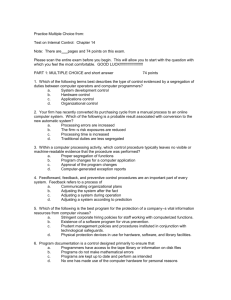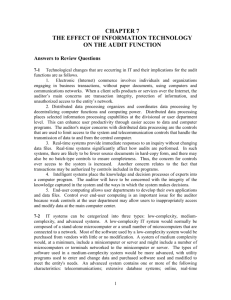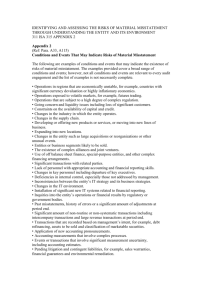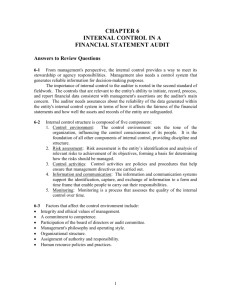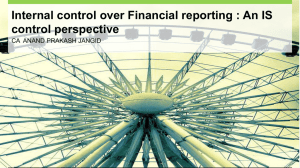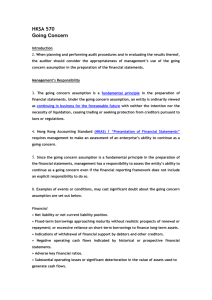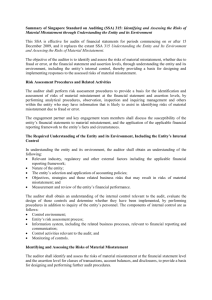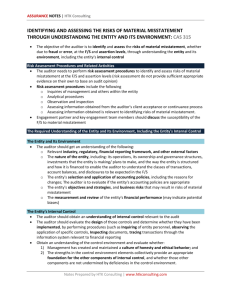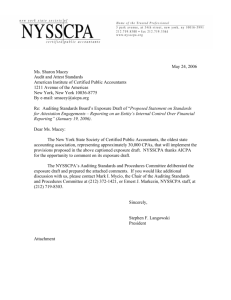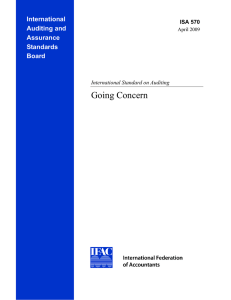GOING CONCERN
advertisement
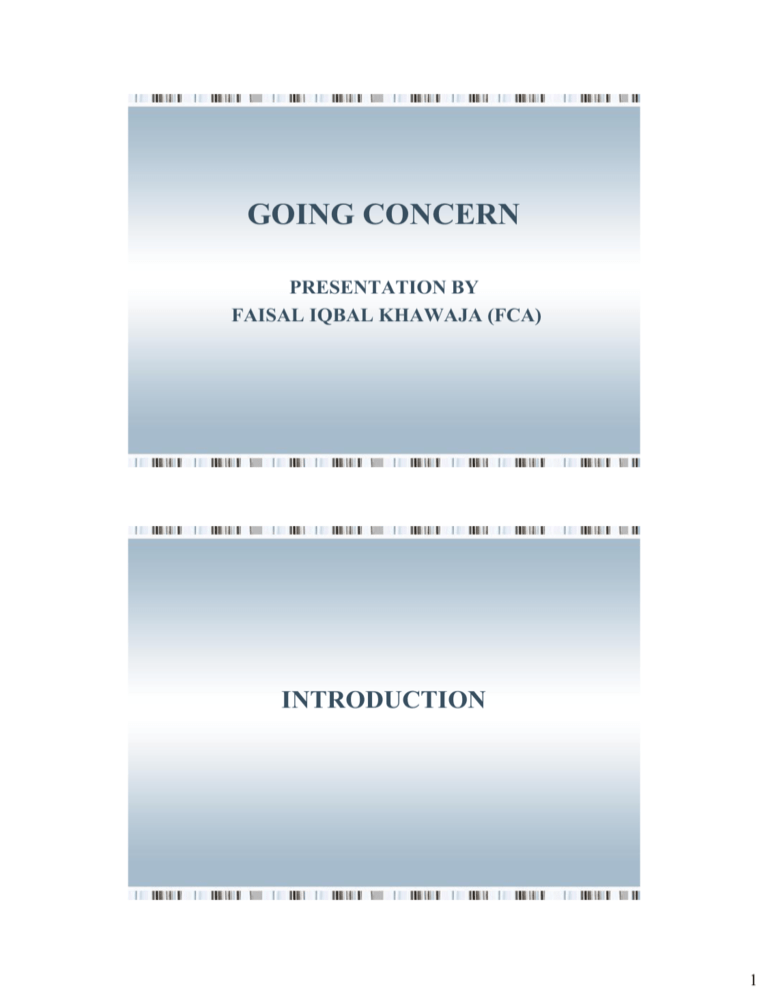
GOING CONCERN PRESENTATION BY FAISAL IQBAL KHAWAJA (FCA) INTRODUCTION 1 The going concern concept is one of the cornerstones of the financial accounting world. In essence, the going concern says that a Balance Sheet of a company must reflect the value of that company as if it were to remain in existence for and beyond the foreseeable future. The opposite of the going concern concept, so to speak, is to say that the company will fold within one year from the Balance Sheet date. We will see in this session that the going concern concept is vital for us to be able to take as much of a rational view of a company as is possible. In this session, we will discuss the following key questions: who makes the going concern assessment and why?; and how do we arrive at the liquidation value of a company and/or its assets when there is a threat foreseen to going concern assumption? What are the external auditors duties and liabilities in respect of auditors report. 2 Going Concern why important? Some financial reporting frameworks contain an explicit requirement for management to make a specific assessment of the entity’s ability to continue as a going concern, and standards regarding matters to be considered and disclosures to be made in connection with going concern. For example, International Accounting Standard (IAS) 1 requires management to make an assessment of an entity’s ability to continue as a going concern. Evaluating Management’s Assessment The auditor shall evaluate management’s assessment of the entity’s ability to continue as a going concern. Management’s assessment of the entity’s ability to continue as a going concern is a key part of the auditor’s consideration of management’s use of the going concern assumption. It is not the auditor’s responsibility to rectify the lack of analysis by management. The auditor shall cover the same period as that used by management to make its assessment Normally it is a period of 12 months This period of assessment may be more than twelve months if required by the applicable financial reporting framework, or by law or regulation if it specifies a longer period. 3 Cont. If management’s assessment of the entity’s ability to continue as a going concern covers less than twelve months from the date of the financial statements the auditor shall request management to extend its assessment period to at least twelve months from that date. In evaluating management’s assessment, the auditor shall consider whether management’s assessment includes all relevant information of which the auditor is aware as a result of the audit Events or Conditions That May Cast Doubt about Going Concern Assumption Financial Net liability or net current liability position. Fixed-term borrowings approaching maturity without realistic prospects of renewal or repayment; or excessive reliance on short-term borrowings to finance longterm assets. Indications of withdrawal of financial support by creditors. Inability to obtain financing for essential new product development or other essential investments. 4 Cont. Adverse key financial ratios. Substantial operating losses or significant deterioration in the value of assets used to generate cash flows. Negative operating cash flows indicated by historical or prospective financial statements. Arrears or discontinuance of dividends. Cont. Inability to pay creditors on due dates. Inability to comply with the terms of loan agreements. Change from credit to cash-on-delivery transactions with suppliers. 5 Operating Management intentions to liquidate the entity or to cease operations. Loss of key management without replacement. Loss of a major market, key customer(s), franchise, license, or principal supplier(s). Labor difficulties. Shortages of important supplies. Emergence of a highly successful competitor. Other Non-compliance with capital or other statutory requirements. Pending legal or regulatory proceedings against the entity that may, if successful, result in claims that the entity is unlikely to be able to satisfy. Changes in law or regulation or government policy expected to adversely affect the entity. Uninsured or underinsured catastrophes when they occur. 6 MITIGATING FACTORS The significance of such events or conditions often can be mitigated by other factors. For example, the effect of an entity being unable to make its normal debt repayments may be counter-balanced by management’s plans to maintain adequate cash flows by alternative means, such as by disposing of assets, rescheduling loan repayments, or obtaining additional capital. Similarly, the loss of a principal supplier may be mitigated by the availability of a suitable alternative source of supply. Important Note The auditor shall remain alert throughout the audit for audit evidence of events or conditions that may cast significant doubt on the entity’s ability to continue as a going concern. 7 Additional Audit Procedures When Events or Conditions Are Identified which cast a significant doubt on enterprise ability to continue as going concern Analyzing and discussing cash flow, profit and other relevant forecasts with management. Analyzing and discussing the entity’s latest available interim financial statements. Inquiring of the entity’s legal counsel regarding the existence of litigation and claims and the reasonableness of management’s assessments of their outcome and the estimate of their financial implications. Cont. Reading minutes of the meetings of shareholders, those charged with governance and relevant committees for reference to financing difficulties. Reading the terms of debentures and loan agreements and determining whether any have been breached. Confirming the existence, legality and enforceability of arrangements to provide or maintain financial support with related and third parties and assessing the financial ability of such parties to provide additional funds. Evaluating the entity’s plans to deal with unfilled customer orders. 8 Cont. Performing audit procedures regarding subsequent events to identify those that either mitigate or otherwise affect the entity’s ability to continue as a going concern. Confirming the existence, terms and adequacy of borrowing facilities. Obtaining and reviewing reports of regulatory actions. Determining the adequacy of support for any planned disposals of assets. Audit Conclusions and Reporting 9 Audit Reporting When Disclosure of Material Uncertainty Is Adequate (Mitigating Circumstances Exist) Emphasis of Matter Without qualifying our opinion, we draw attention to Note X in the financial statements which indicates that the Company incurred a net loss of ZZZ during the year ended December 31, 20X1 and, as of that date, the Company’s current liabilities exceeded its total assets by YYY. These conditions, along with other matters as set forth in Note X, indicate the existence of a material uncertainty that may cast significant doubt about the Company’s ability to continue as a going concern. Cont. In situations involving multiple material uncertainties that are significant to the financial statements as a whole, the auditor may consider it appropriate in extremely rare cases to express a disclaimer of opinion instead of adding an Emphasis of Matter paragraph. ISA 705 provides guidance on this issue. 10 Audit Reporting When Disclosure of Material Uncertainty Is Inadequate Basis for Qualified Opinion The Company’s financing arrangements expire and amounts outstanding are payable on March 19, 20X1. The Company has been unable to re-negotiate or obtain replacement financing. This situation indicates the existence of a material uncertainty that may cast significant doubt on the Company’s ability to continue as a going concern and therefore the Company may be unable to realize its assets and discharge its liabilities in the normal course of business. The financial statements (and notes thereto) do not fully disclose this fact Qualified Opinion In our opinion, except for the incomplete disclosure of the information referred to in the Basis (or “give a true and fair view of”), the financial position of the Company as at December 31, 20X0, and of its financial performance and its cash flows for the year then ended in accordance with Cont. Basis for Adverse Opinion The Company’s financing arrangements expired and the amount outstanding was payable on December 31, 20X0. The Company has been unable to re-negotiate or obtain replacement financing and is considering filing for bankruptcy. These events indicate a material uncertainty that may cast significant doubt on the Company’s ability to continue as a going concern and therefore the Company may be unable to realize its assets and discharge its liabilities in the normal course of business. The financial statements (and notes thereto) do not disclose this fact. Adverse Opinion In our opinion, because of the omission of the information mentioned in the Basis for Adverse Opinion paragraph, the financial statements do not present fairly (or “give a true and fair view of”) the financial position of the Company as at December 31, 20X0, and of its financial performance and its cash flows for the year then ended in accordance with. 11 Use of Going Concern Assumption Inappropriate In the auditor’s judgment, management’s use of the going concern assumption in the • financial statements is inappropriate If the financial statements have been prepared on a going concern basis but The requirement for the auditor to express an adverse opinion applies Regardless of whether or not the financial statements include disclosure of the • inappropriateness of management’s use of the going concern assumption. THANK YOU !!!! 12
